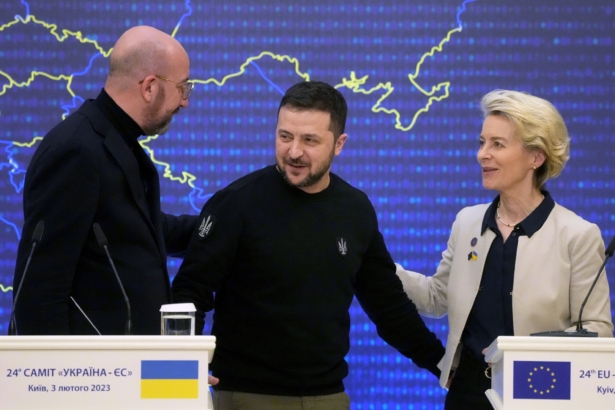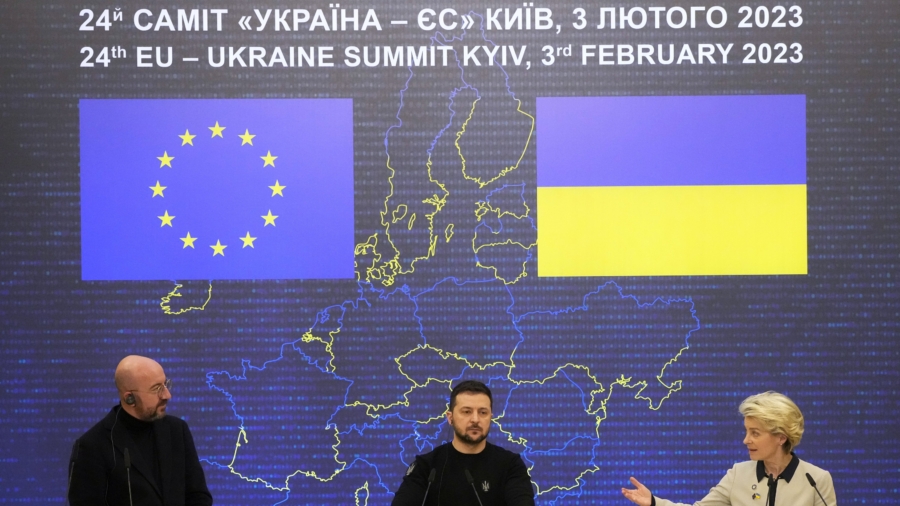KYIV, Ukraine—The European Union will unveil its 10th package of sanctions against Russia on Feb. 24 to mark the anniversary of Moscow’s full-scale invasion of Ukraine, a senior official from the bloc said in Kyiv on Friday, as Ukrainian forces gird for an expected Russian offensive in the coming weeks.
The sanctions will target technology used by Russia’s war machine, among other things, European Commission President Ursula von der Leyen told a news conference.
The sanctions will take aim in particular at components used in the manufacturing of drones, she said, naming Iran as a key supplier of Russia.
Closing loopholes that the Kremlin uses to circumvent sanctions will also be a priority, according to Von der Leyen, who was on her fourth visit to the Ukrainian capital since the war began.
The exact measures in the next EU sanctions package must be agreed upon by the bloc’s 27 member countries—a process that can take weeks.
Top EU officials met with Ukrainian President Volodymyr Zelenskyy in a show of support for the country as it battles to counter the Kremlin’s forces and strives to join the EU as well as NATO.
The last such summit was held in Kyiv in October 2021—a few months before the war started. The highly symbolic visit is also the first EU political mission of its kind to a country at war.
The high-level meeting came as a 60-year-old man was killed and six others were wounded Friday when Russian missiles hit central Toretsk, in Ukraine’s eastern Donetsk region, the local prosecutor’s office said in a statement on Facebook.
Ukrainian authorities reported Friday that at least six civilians were killed and 20 others were wounded over the previous 24 hours.
Among the dead were two brothers, ages 49 and 42, killed when Russian shelling destroyed an apartment building in the northeastern Kharkiv region, Ukraine’s presidential office said. Their 70-year-old father was hospitalized with injuries.
Also, six people were wounded and 18 apartment buildings, two hospitals and a school were damaged in a Russian attack in the eastern city of Kramatorsk on Thursday, Gov. Pavlo Kyrylenko told Ukrainian TV. Four people died when a Russian missile hit an apartment building in that city on Wednesday.
European officials were adamant about continuing to support Ukraine militarily and economically, but they didn’t provide any new details about Ukraine’s accession path to the EU.
Zelenskyy said Ukraine’s goal “is to start negotiations this year.” But the process will likely take years and require the adoption of far-reaching reforms, including a clampdown on endemic corruption as the country receives billions of dollars in aid. Kyiv formally submitted its application last June.
Zelenskyy said progress had been made to further integrate Ukraine economically into the EU across several sectors, including agriculture, industry, energy and customs.

Ukraine’s government is keen to get more Western military aid, on top of the tanks pledged last week, as the warring sides are expected to launch new offensives once winter ends. Kyiv has pushed the West to provide fighter jets and long-range missiles.
The U.S announced Friday it will send longer-range bombs to Ukraine, along with air defense systems and other weapons and ammunition as part of a new $2.17 billion aid package. The rocket-propelled, GPS-guided, ground-launched, small-diameter bombs (GLSDB) are fired from HIMARS rocket launchers and glide to targets up to 150 kilometers (93 miles) away, twice as far as the previously supplied U.S. rockets for HIMARS systems could reach.
Pentagon Press Secretary Brig. Gen. Pat Ryder noted that the bombs will give the Ukrainian armed forces a longer range capability and enable them to “conduct operations in defense of their country and to take back their sovereign territory.”
Asked to comment on the U.S. move, Kremlin spokesman Dmitry Peskov pointed to Thursday’s statement by Russian President Vladimir Putin, who likened the Russian action in Ukraine to fighting the Nazis in World War II and issued an ominous warning to the West for announcing new weapons shipments.
“Those who hope to defeat Russia on the battlefield apparently fail to understand that a modern war against Russia will be a completely different war for them,” Putin said. “We do not send our tanks to their borders, but we have something to respond with, and it is not limited to the use of armour.”
France and Italy also agreed Friday to supply Ukraine with a SAMP/T-MAMBA air-defense system, which French officials call the European equivalent of the Patriot system that the U.S. has given Ukraine. The missile battery is slated for delivery this spring.
Kyiv’s forces “have a chance” of beating back an expected Russian offensive in eastern Ukraine if supplied with the right Western weapons, Zelenskyy said.
“Our task is not to give them (an) opportunity (for revenge) until our army is strengthened with appropriate weapons. I think we have a chance,” Zelenskyy added.
Officials in the eastern Luhansk region said Russian forces have disabled mobile internet connections, stepped up shelling and deployed more troops in preparation for an offensive.
EU assistance for Ukraine has reached almost 50 billion euros ($55 billion) since the fighting started, according to officials from the bloc.
The EU is providing Ukraine with financial and humanitarian aid, and announced it is ramping up its military training mission, from an initial target of pushing 15,000 troops through the schooling to up to 30,000 troops. One focus is to train the crews of tanks that Western countries have offered Ukraine.
By Susie Blann

